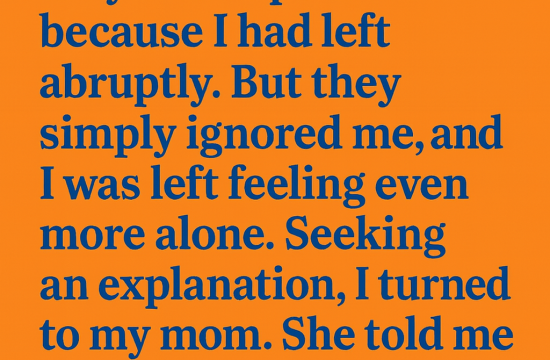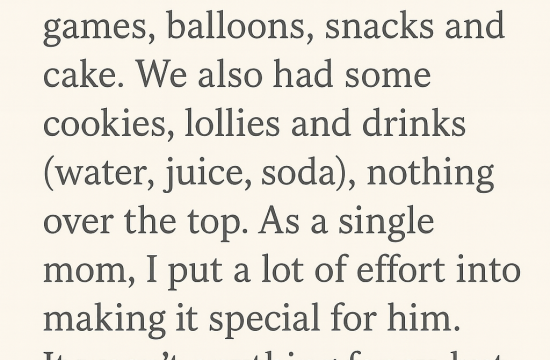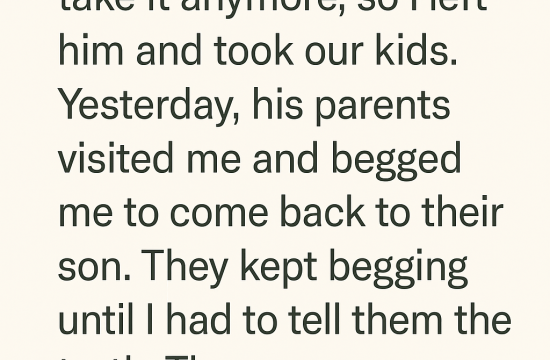My mother-in-law got too involved in our family life, so Daniel and I decided to take a vacation from her and drive to the coast. Just as we were about to leave town, she begged us to stop by. We relented, thinking it would be a quick visit.
As always, she played her subtle games. She brought out a plate with an omelet and a piece of cake for Daniel, and for me—just a plain piece of toast, dry, with no butter.
I smiled, though my stomach twisted. That was her specialty: silent jabs, disguised as kindness. Daniel’s eyes flickered between the toast and my face, guilt written all over him. But like always, he said nothing. His mother had mastered the art of making everyone else feel guilty while she floated, angelic and blameless.
We left after thirty minutes. I told myself the trip would be better. Just the sea, the wind, the two of us—no passive-aggressive comments or unsolicited advice.
For the first hour on the road, I stayed quiet, staring out the window, wondering if this vacation would heal us—or just remind me again that Daniel never stood up for me.
“I’m sorry about the toast,” he said suddenly.
“Sorry doesn’t change the pattern,” I murmured.
He sighed. “I just don’t want to fight with her all the time.”
“And what about me?” I asked. “Don’t you think I get tired of her treating me like I don’t belong in your life?”
His silence said more than words.
By the time we reached the beach town, the sky was streaked with sunset. I breathed in the salt air, letting it calm my tense shoulders. That night, we walked barefoot on the sand, hand in hand. For the first time in months, I felt a flicker of hope.
The little cottage we rented was cozy and imperfect—chipped window frames, an old kettle that whistled like a blues singer. I loved it instantly. For two days, we read on the porch, ate seafood, and actually laughed together. But on the third day, his mother called.
I saw her name on his phone. He hesitated, then answered. Even across the room, I could hear her voice, sharp and panicked.
“She says the neighbor saw someone suspicious near the house,” Daniel told me afterward.
“We’ll check the cameras later,” I replied, tying my shoelaces for our planned hike.
“Maybe we should go back early,” he suggested.
I looked up at him. “You want to cut short our first real vacation in years because your mom is paranoid?”
He faltered. “She’s just worried.”
“No, you’re worried that she’s worried,” I said.
He sighed, but didn’t argue.
That night, sitting on the dunes, I told him, “I can’t keep living like a guest in my own marriage. I need to know we’re building our life—not hers for us.”
It was the most honest talk we’d had in months. The next morning, he surprised me—he made breakfast. Eggs, buttered toast, coffee exactly how I like it.
“I called her earlier,” he said. “Told her I need space. She cried and hung up. And I didn’t call back.”
That day, we rode bikes along the coast and ate fish tacos at a shack by the pier. For the first time, I felt like I was with my husband—not his mother’s son.
But peace never lasts forever.
When we returned home, there was a note taped to the door. She had used her spare key to “water the plants,” but inside, our house was rearranged. Furniture moved. Our bed remade with her sheets. Some of my photos missing.
“This is too much,” I said.
Daniel nodded, finally. “You’re right.”
The next morning, I changed the locks. She didn’t reply to my message about it, but three days later she appeared with a box of my things she claimed she had “found” in her attic—old journals, a scarf my mom knitted, even a broken necklace from college.
“I only ever wanted what’s best for my son,” she said softly.
I stared at her. “And this wasn’t yours to keep.”
That was the last we saw of her for months.
At first, Daniel struggled. But then, something shifted. Without her constant interference, we found each other again. We cooked, laughed, and talked more. One night, when she called, Daniel declined it and said, “She can wait.” My heart softened.
Later, he suggested inviting her for dinner—on our terms. I hesitated but agreed.
She came, pie in hand, smile too tight. Dinner was polite, guarded. But at the door, she looked at me and said, “You’ve made this house warm. I see that now.”
It wasn’t quite an apology, but it was close.
In the months that followed, she changed—slowly. She asked before visiting. She complimented me in awkward but sincere ways. Then one afternoon, she invited me to lunch. Just me. Over salads, she looked me in the eye and said, “I didn’t know how to let go. And I’m sorry.”
I didn’t cry. But I felt something loosen inside me.
We’re still learning, still navigating boundaries. But here’s the truth: sometimes peace doesn’t come from palm trees or ocean waves. Sometimes it comes from changing a lock. From saying no. From refusing to let someone else write your story.
Daniel and I aren’t perfect. But we’re stronger now—because we finally built a wall where one was needed. And she? She’s still herself, just… less involved. And for now, that’s enough.
Because life doesn’t always hand you peace. Sometimes, you build it yourself—brick by brick, boundary by boundary.











